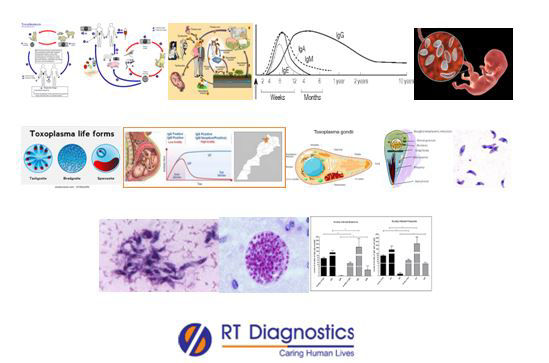Toxoplasma - IgM:
Why Toxoplasma IgMTest ?
CLINICAL INFORMATION
Toxoplasma gondii is a protozoan – unicellular parasite (obligate intracellular parasite) that causes toxoplasmosis in humans. Toxoplasmosis is one of the main causes of death from foodborne disease worldwide. The definitive hosts for Toxoplasma gondii are members of the family Felidae (cats). Other sources of Toxoplasma gondii infection include raw or undercooked oysters, mussels, clams, mollusks, consumption of unpasteurized milk, consuming unwashed fruits and vegetables etc. Un-sporulated oocytes (sporozoites are found in oocysts) are shed in the cat’s faeces. These oocytes sporulate in the environment and become infective. The intermediate hosts become infected when they come in contact with infected cat faeces contaminated with oocysts. Shortly after the infestation these oocysts transform into tachyzoites (also called as tachyzoicmerozoites) and get imbedded deep into neural and muscle tissue and thus develop into a tissue cyst bradyzoites (also referred to as bradyzoicmerozoites). These parasites present in the tissue cysts remain (throughout the life) in the human host most commonly in the skeletal muscle, myocardium, brain, eyes etc. Incidence of human to be infected with Toxoplasma gondii can be due to conditions such as consuming undercooked meat of animals harboring tissue cysts, food or water contaminated with toxoplasma gondii or infected cat faeces, blood transfusion or organ transplant, vertical transmission (trans-placental) from pregnant mother to the fetus. Clinical manifestations include flu-like symptoms, body ache, headache, fever (chills), prostration, fatigue, swollen lymph nodes (especially in the neck), sore throat, pharyngitis, reduced vision, blurred vision, red eye, tearing or watering from the eyes, severe inflammation of the retina (ocular toxoplasmosis - Retinochoroditis), lung infection, enlarged liver and spleen, jaundice, confusion, seizure, polymyositis, pregnant woman with stillbirth, miscarriage etc. While signs and symptoms in life-threatening baby show up with clinical manifestations of poor feeding, swollen lymph nodes, jaundice, enlarged liver and spleen, anaemia, low platelet count, petechial rashes, maculopapular rash, nystagmus, focal seizure, Low birth weight, cerebral calcifications, hydrocephalus, microcephaly (smaller head than normal), macrocephaly (larger head than normal), cerebral palsy etc. Latent symptoms in children show symptoms of vision problems, hearing loss, learning disorders, intellectual disability, developmental delay, encephalitis, associated with heart (myocarditis) or lung infections etc. Severe toxoplasmosis can cause damage to the eyes, brain and other organs. Newborn infants infected with Toxoplasma gondii and/or immunocompromised patients with a weakened immune system, patients with chemotherapy, and patients on steroids or immunosuppressant drugs are more likely to be prone to toxoplasmosis. Toxoplasma IgG test checks for antibodies in the blood for Toxoplasma gondii infection in the newborn and/or suspected infected patients and/or screens a pregnant woman for antibodies against Toxoplasmosis. A Positive IgM test result confirms recent exposure to Toxoplasma gondii. Serological tests (like ELISA for the detection of antigen or antibody) are performed for the diagnosis of toxoplasmosis. Tissue biopsy may be performed as a confirmatory test for Toxoplasma gondii. Neurological (CNS) manifestations with signs and symptoms may require a CSF sample specimen for clinical diagnosis. Toxoplasmosis caused by Toxoplasma gondii is one of the TORCH panel tests for antenatal screening and hence DNA tests like PCR may be conducted in the amniotic fluid in the suspected pregnant woman. Additional tests include histopathology studies (biopsy for tissue cysts), imaging studies such as CT Scan, MRI (brain MRI in encephalitis – ring-enhancing intracranial mass lesion), ultrasound for changes in the brain, eyes, ears and other organs etc.

General Instructions:
Sample Requirement: Specimen - Blood sample collected from the vein. Test Preparation: None.
NOTE - Sample for specimen collections may vary based on the patient’s condition/cases according to the patient’s presenting complaints/signs or symptoms:
SPECIMEN REQUIREMENT (Special or Rare Cases) - As instructed and guided by Physician / Clinician / Pathologist / as per Laboratory’s requirements, according to procedures and protocols.
This Multi-Specialty Clinical Referral Laboratory RT DIAGNOSTICS provides precise and accurate tests with an extensive range of testing services to the medical centres to help in the diagnosis and identification of pathology in the test specimens for infectious diseases and also to evaluate the function of organ systems of the the patient. It prevents further complications and helps to stabilize and restore health to near normalcy at the earliest without delay.



